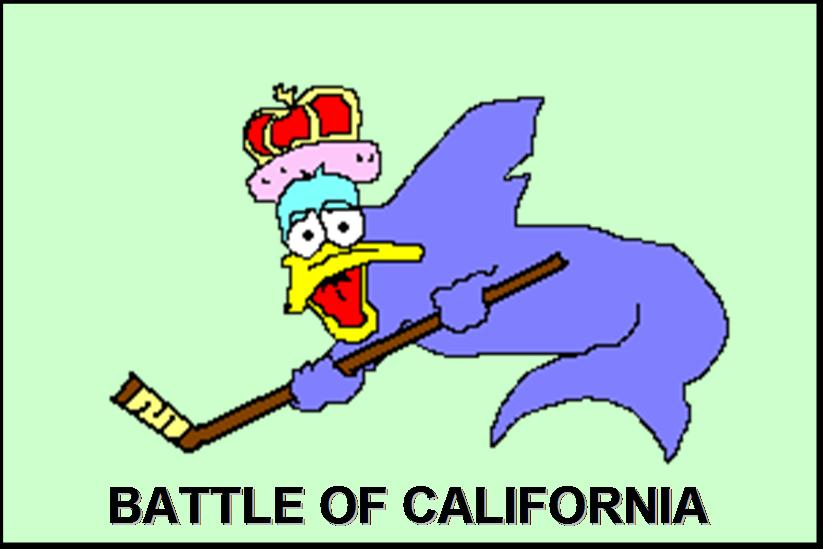Who's up for a little game theory?
Kuklas Korner has a piece today on soon-to-be-UFA Ryan Malone and how Columbus might trade for his rights Philadelphia-style in order to get a pre-July-1st negotiating window:
An NHL source said that Malone has been low-balled twice by the Penguins and is ready to leave July 1 as an unrestricted free agent. Malone’s rights could be traded before that day, of course, and the Blue Jackets are a likely destination.Now this is a move that puzzled me when Philadelphia did it last summer with the Nashville Predators (Hartnell and Timonen), and it's a move that puzzles me still today. For certain, I can understand Nashville's and Pittsburgh's motivation -- why lose a player for nothing July 1st if some team is willing to pay assets mid-June? As for the other parties, I really fail to see what the benefits are for Ryan Malone or the Columbus Blue Jackets.
The source said the Penguins have already made the Blue Jackets an offer for Malone’s rights.
I threw together a simple game theory table together below that oversimplifies the choices of Columbus and Malone, but essentially Columbus has a choice: outbid 29 other teams for Malone, or not. Malone also has a choice: sign before July 1st, or wait.
| Malone will sign before July 1st | Malone won't sign until July 1st | |
|---|---|---|
CBJ will offer the highest bid | CBJ loses a draft pick unnecessarily | CBJ loses a draft pick unnecessarily |
CBJ will not offer the highest bid | Malone loses salary unnecessarily | CBJ loses Malone, both sides are indifferent to the trade |
I've included some loose payoffs where the decisions intersect. If Columbus is willing to pay more for Malone than anyone else, there seems to be no benefit to make a pre-July trade; they can win his services on July 1st without surrendering a draft pick. If another team is willing to pay more than Columbus, however, then there is no benefit for Malone to sign with the Jackets in June.
In other words, there is no great reason I can see for Columbus to trade for Malone's negotiating rights, at least with the payoffs as I've structured it. At best, both sides are indifferent about the trade (if Malone signs elsewhere July 1st), but in all other outcomes one of the parties is worse off because of the trade.
Now I know I've made some strong assumptions here (NHL teams act rationally, or that Malone only considers dollars when making a UFA decision), and I haven't considered all the payoffs: one thing that Philly did get from its trade-and-sign last year was an improved perception from the UFA class ("Those Flyers are serious about winning"), which may have helped them land Briere. Still, even with the turnaround success of the Flyers, I'm dubious as to what advantage they gained by the Nashville trade. Couldn't they have signed Hartnell and Timonen on July 1st, kept their draft pick, and still had that success?
What do you think? Is there a hole in my logic? Comments are open for your criticisms.









9 comments:
I think teams at the low end of the standings may need that extra month to sell and entice free agents, its not an impulse sign even if they are the highest bidder.
Well, a month is pushing it. At this point, Columbus has about two weeks to impress, assuming they're not doing anything before Monday.
Last year, Philly made their acquisition and signing on June 18, even less time.
But point taken.
My only guess would be that the team acquiring the rights has to have some reason to believe the player [or players in Philly's case] are very receptive to signing with them. So maybe in each case they've spoken with the agents and there seems to be some interest.
That's the only logical way it makes sense to me.
Even then, though, that bothers me. If a player is receptive to signing with a team, that to me is more of a reason to wait until July 1st and keep the team's draft pick.
If there's a fear that the player will balk on that interest in the face of bigger offers, then that player should really think twice about hastily signing, I'd think.
Well making the trade is 2 for 2 thus far. If Columbus signs Malone before July 1st then that makes this scenario 3 for 3. Not the largest pool of data for sure, but it suggests that the teams felt confident enough about their chances that they were willing to make a trade in order to sign the player before he hits the free market.
As to why do it before July 1st, I think Edmonton's experience with Michael Nylander might provide at least one good reason.
From a Columbus standpoint, they get:
a) the ability to show Malone they are very interested without tampering
b) the potential ability to sign Malone for a competitive amount of money without the variance of the open market.
Malone gets
a) the knowledge that a team is very interested, and would likely make him a cornerstone of the franchise
b) the stability of getting a competitive offer already on the table, so he doesn't get Anson Carter'd.
If it's a 7th round pick next year, I'd say the intangibles may be worth it for the Jackets. Also, keep in mind some GMs do things for the overall message (as you mentioned), but also the agent's benefit, since some agents represent many high-profile players. It wouldn't be the first time I've heard of a GM making a seemingly misguided move to curry favor.
a) the ability to show Malone they are very interested without tampering
I guess this is worth something, but I dunno. July 1st is a good time to show interest also.
b) the potential ability to sign Malone for a competitive amount of money without the variance of the open market.
I don't buy this terribly, either. Assuming Malone is no fool, they'd basically have to offer him a July 1st salary or he'd just wait it out. Sure, the market might go crazy, but that's another reason why Malone probably waits.
a) the knowledge that a team is very interested, and would likely make him a cornerstone of the franchise
Again, knowledge that could be gained July 1st. There's no real necessity to know this in June, I think.
b) the stability of getting a competitive offer already on the table, so he doesn't get Anson Carter'd.
This is baloney, especially this offseason. With a high cap and a limited pool of UFAs, there's no way this happens to Malone. I wouldn't worry terribly about it, at least.
I guess I'm just saying, are these things worth very much? Worth a draft pick? A million in annual salary? I'd be inclined to prioritize differently.
As to why do it before July 1st, I think Edmonton's experience with Michael Nylander might provide at least one good reason.
I think the lesson there is to get a binding signature before making an announcement. Other than that, I see teams lose UFA bids every year; Nylander's only an anomaly because Lowe thought he had a commitment but didn't.
Philly's also somewhat of an anomaly from last year, since the draft picks they sent to Nashville were the ones they had acquired from the Preds in the Pete Forsberg trade. Getting an early window to negotiate with and sign Timmonen and Hartnell essentially wound up being one of the perks of the Forberg swap. So, you could argue the Flyers weren't really giving up anything new (and certainly Nashville's picks weren't going to be nearly so high as Philly's last year).
I agree there are other, indirect, less tangible benefits to something like this, whether they be showing other UFAs you mean business (or maybe this is somehow a ploy to get Hainsey to re-sign in Columbus instead of leaving), or to make a statement to the fan base that the team is committed to winning this year and fully intends to be active in improving the club in order to get more season tickets sales and renewals.
And trades like this might make more sense if the NHL awarded compensatory picks for certain UFAs lost (I'm under the impression they used to have this but got rid of it under the new CBA -- I recall the Preds taking Mike Richter in the expansion draft, knowing they wouldn't even try to sign him as a UFA, just to get the extra picks as the franchise got off the ground, but I think now compensatory picks are just for RFAs lost). At least then you could argue that there's something of a safety net should the player not sign with the new rights owner. Although, in that case, you'd have to wonder what the motivation would be of a team like Pittsburgh to give up those picks, unless Columbus was offering something much better than a mid-round pick for the rights.
Great points, Dubcek, especially about the Forsberg aspect of last year's trade -- I had totally forgotten about that.
We'll see (perhaps) what the CBJ end of the trade ends up being in this one. It is interesting to me that PIT seems to have made the trade offer; I wonder what they perceive Malone's rights to be worth?
Post a Comment